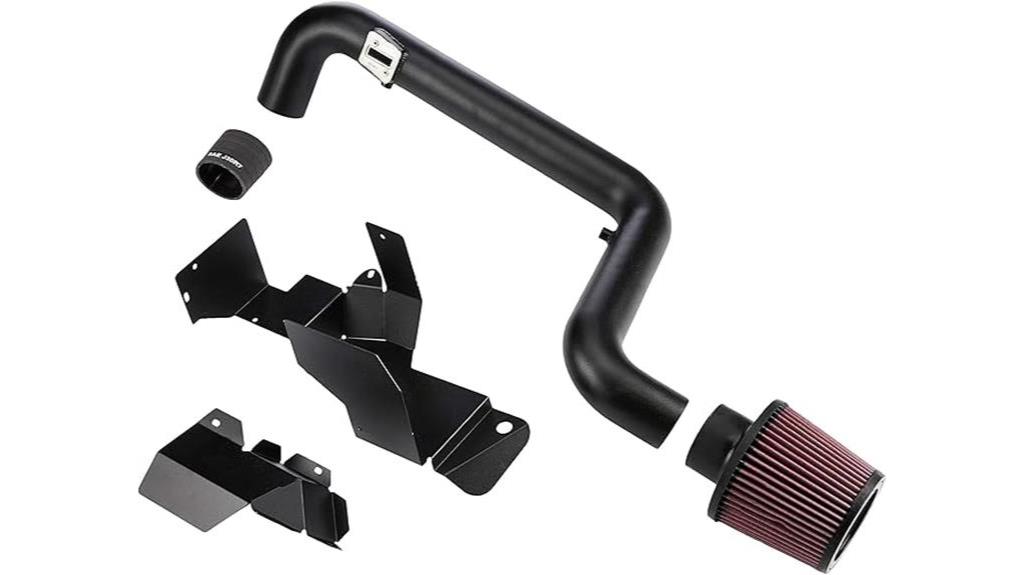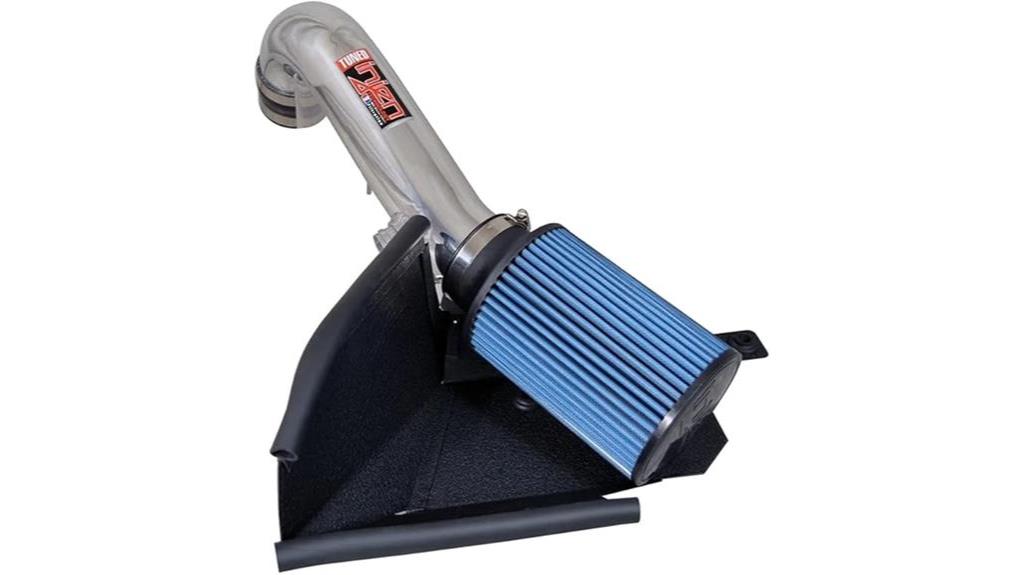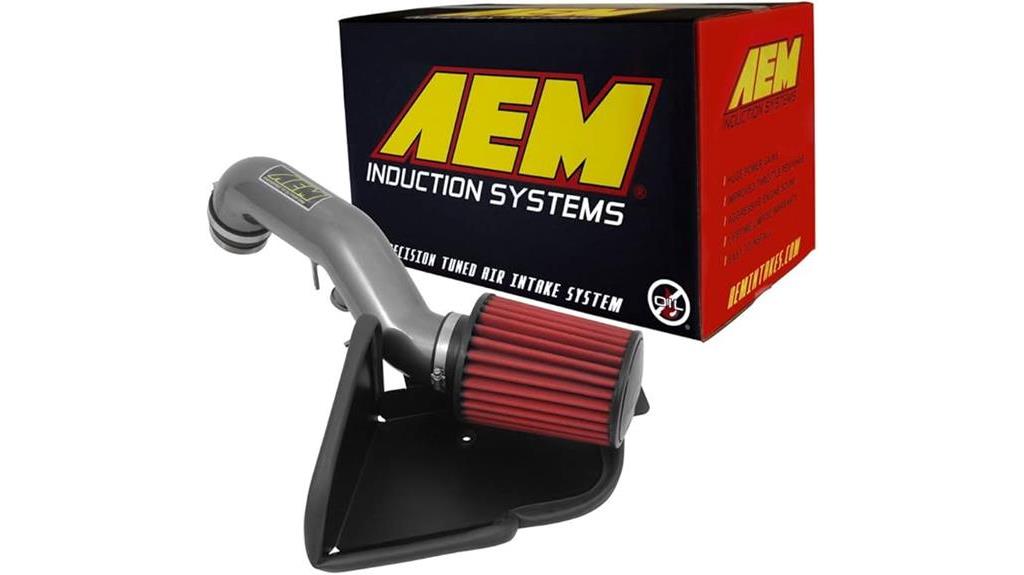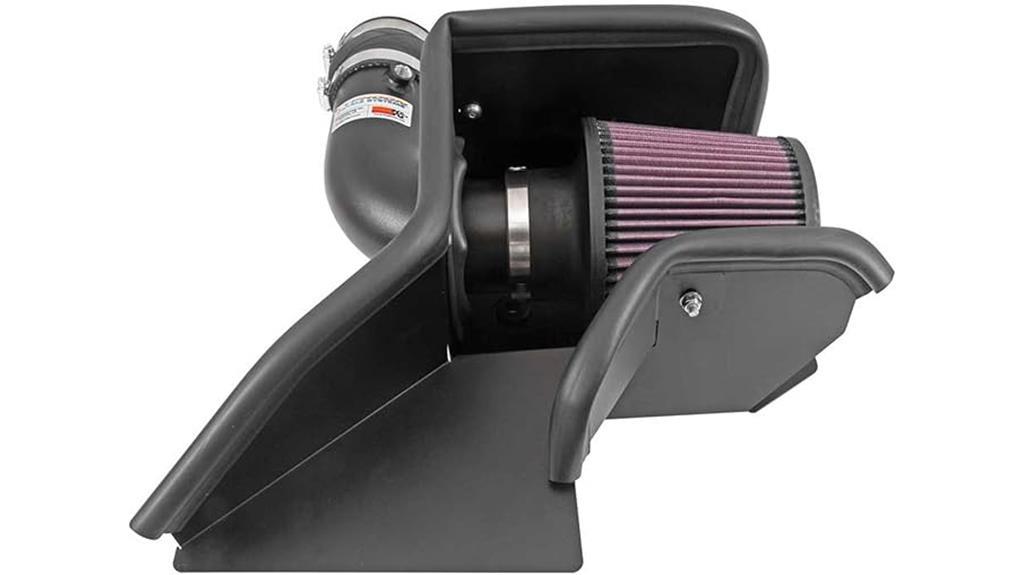When you think about enhancing your Volkswagen GTI's performance, a cold air intake can be one of the best upgrades you make. Not only do these systems improve horsepower and torque, but they also add a distinctive edge to your vehicle's style and sound. With so many options available, it can be tough to determine which ones truly stand out. Let's explore the top five cold air intakes that could elevate your driving experience and give your GTI a unique flair.
Quick Takeaways
- The K&N Cold Air Intake Kit offers up to 50% increased airflow, enhancing acceleration and throttle response for 2003-2008 models.
- Injen Technology SP Short Ram Intake provides up to 13 horsepower and 17 lb-ft of torque gains, with no additional tuning needed.
- AEM's Cold Air Intake System relocates the filter for cooler air intake, improving performance while requiring minimal maintenance.
- Installation for most kits ranges from 30 minutes to over an hour, often needing just basic tools for setup.
- Consider factors like compatibility, performance gains, and maintenance to choose the best cold air intake for your Volkswagen GTI.
K&N Cold Air Intake Kit for 2003-2008 Audi/Volkswagen/Seat (69-9503TFK)

The K&N Cold Air Intake Kit (69-9503TFK) is an ideal upgrade for enthusiasts of the 2003-2008 Audi, Volkswagen, and Seat models equipped with a 2.0L L4 engine, including the GTI. This kit greatly boosts performance by allowing up to 50% more airflow compared to factory options, enhancing acceleration and throttle response. Installation is straightforward and typically takes less than an hour with basic tools, although some users may find the removal of stock parts challenging. Maintenance is minimal, as the filter lasts up to 100,000 miles without needing cleaning. With a 10-Year/Million Mile Warranty, this cold air intake not only protects the engine but also improves gas mileage, making it a valuable investment for drivers seeking performance and reliability.
Best For: Enthusiasts of 2003-2008 Audi, Volkswagen, and Seat models seeking enhanced performance and improved engine sound from their 2.0L L4 engine vehicles.
Pros:
- Dyno-tested performance with up to 50% more airflow than factory systems for improved acceleration and throttle response.
- Simple installation process that typically takes less than an hour using basic hand tools.
- Minimal maintenance required, with the high-flow filter lasting up to 100,000 miles without cleaning.
Cons:
- Some users may encounter difficulties during installation, particularly with removing stock parts.
- Installation instructions may not be sufficiently clear for all users, leading to potential confusion.
- Users are recommended to purchase a K&N filter cleaning kit for future maintenance, which adds to the overall cost.
Injen Technology SP Short Ram Intake System (SP3078BLK)

For those looking to boost performance without requiring additional tuning, the Injen Technology SP Short Ram Intake System (SP3078BLK) stands out as an ideal choice for 2015-2019 Volkswagen GTI owners. This system is designed for a direct fit, providing dyno-proven gains of up to 13 horsepower and 17 lb-ft of torque. Crafted from high-quality 6061-T6 aluminum, it features a custom heat shield and a fully serviceable Injen SuperNano-Web dry air filter. Installation is straightforward and takes about 45 minutes with basic tools. Users appreciate the aggressive engine tone and enhanced turbo sounds, although some have raised concerns about heat soak. Overall, it offers a budget-friendly option with notable performance and aesthetic appeal.
Best For: Those seeking a performance upgrade for their 2015-2019 Volkswagen GTI without the need for additional tuning.
Pros:
- Easy installation with a direct fit design, taking approximately 45 minutes with basic tools.
- Dyno-proven gains of up to 13 horsepower and 17 lb-ft of torque enhance overall performance.
- Aggressive engine tone and improved turbo sounds elevate the driving experience.
Cons:
- Some users report concerns about heat soak, indicating a potential need for heat shield enhancement.
- Not currently CARB exempt, which may affect legality in certain regions.
- Limited compatibility, as it does not fit vehicles equipped with MAF Sensor.
AEM 21-802C Cold Air Intake System (AEM-21-802C)

Designed specifically for Volkswagen GTI enthusiasts, the AEM 21-802C Cold Air Intake System offers a significant upgrade from the factory setup. This vehicle-specific intake replaces the restrictive air box and filter, relocating the air filter outside the engine compartment to draw in cooler air. Cooler air enhances combustion efficiency, resulting in potential horsepower and torque gains. The system features an oversized AEM Dry flow synthetic washable air filter, along with a mandrel-bent aluminum intake tube to reduce restriction and intake temperature. While installation is generally praised for its ease, some users reported minor issues. Overall, the AEM 21-802C is recognized for its improved engine sound and perceived value, although debates about actual power gains continue among enthusiasts.
Best For: Volkswagen GTI enthusiasts looking to enhance their vehicle's performance and engine sound with an upgraded cold air intake system.
Pros:
- Improves horsepower and torque by providing cooler air for combustion efficiency.
- Easy installation process with quality components and clear instructions.
- Washable air filter allows for low maintenance and long-term use.
Cons:
- Some users reported minor installation issues, such as filter rubbing against brackets.
- Power gains may be debated among enthusiasts, leading to skepticism about performance claims.
- Not legal for sale or use in California or similar states due to emission regulations.
AEM High Performance Cold Air Intake for AUDI/Volkswagen Vehicles

With its ability to enhance horsepower and throttle response, the AEM 28-30005 High Performance Cold Air Intake stands out as an excellent choice for enthusiasts of Audi and Volkswagen vehicles, particularly the GTI. This intake system is engineered for select models from 2013 to 2021, including the Audi A3 and various Volkswagen models like the Jetta and Tiguan. Its AEM Dryflow air filter is washable and oil-free, capturing up to 99% of harmful contaminants. Users appreciate the straightforward installation process and the durable construction that guarantees peak airflow. While some noted minor fitment issues, the overall feedback emphasizes noticeable performance improvements and easy maintenance, making it a solid investment for performance-driven drivers.
Best For: Performance enthusiasts seeking enhanced horsepower and throttle response in their Audi or Volkswagen vehicles.
Pros:
- Increases horsepower and throttle response significantly.
- Washable, synthetic AEM Dryflow air filter that captures up to 99% of contaminants.
- Straightforward installation process with all necessary hardware included.
Cons:
- Some users reported minor fitment issues with specific models.
- A few customers did not experience a significant horsepower increase.
- Compatibility must be checked carefully to avoid installation problems.
K&N Cold Air Intake Kit for 2013-2014 Volkswagen Jetta 2.0L L4 Diesel

The K&N Cold Air Intake Kit, model 69-9509TTK, offers Volkswagen Jetta 2.0L L4 Diesel owners a significant upgrade in performance and efficiency. Engineered to enhance airflow, it guarantees an increase of up to 6 horsepower and 12 ft.lbs of torque. The reusable air filter features four layers of pleated cotton and requires minimal maintenance, cleaning only every 100,000 miles under normal conditions. Additionally, the durable aluminum intake tube is mandrel-bent and powder-coated, providing both improved airflow and a sleek appearance. Installation is straightforward, typically completed in under 60 minutes without voiding the manufacturer's warranty. Customers praise the improved sound and fuel economy, although some note minor installation challenges. Overall, it's a reliable choice for enhanced Jetta performance.
Best For: Volkswagen Jetta 2.0L L4 Diesel owners seeking improved performance and efficiency without compromising warranty.
Pros:
- Enhanced airflow leads to increased horsepower and torque.
- Reusable air filter with long maintenance intervals (every 100,000 miles).
- Easy installation with step-by-step instructions and no warranty void.
Cons:
- Some users report minor challenges during installation.
- Occasional quality issues noted by customers.
- Performance gains may vary based on driving conditions.
Factors to Consider When Choosing a Cold Air Intake for Volkswagen GTI
When you're picking a cold air intake for your Volkswagen GTI, there are several key factors to keep in mind. Consider performance gains, installation complexity, and whether the materials used will hold up over time. You also want to guarantee compatibility with your engine and think about any sound enhancements you might want.
Performance Gains Overview
Choosing a cold air intake for your Volkswagen GTI can lead to impressive performance gains, often adding up to 13 horsepower and 17 lb-ft of torque over stock setups. These systems considerably increase airflow, providing up to 50% more than factory filters and intake tubes. This boost in airflow enhances throttle response and acceleration, particularly beneficial when towing or driving uphill.
One of the key benefits of a cold air intake is the relocation of the air filter outside the engine compartment, allowing cooler air to enter the engine. Cooler air improves combustion efficiency, which directly contributes to those horsepower and torque gains. Additionally, many cold air intakes are designed to maintain ideal air/fuel ratios, ensuring your engine runs smoothly while delivering a more aggressive tone under full throttle, enhancing your overall driving experience.
Another advantage is their minimal maintenance requirements—most systems only need a cleaning every 100,000 miles. This means you can enjoy long-term performance improvements without the hassle of frequent upkeep. Overall, investing in a cold air intake for your GTI not only boosts performance but also adds to your vehicle's character.
Installation Complexity Factors
Installing a cold air intake for your Volkswagen GTI can be a straightforward process, but several factors influence its complexity. First, the design of the intake system plays a significant role. Some systems require just basic hand tools, while others may need specialized equipment to guarantee a proper fit.
Look for vehicle-specific fitment options, as these can simplify the installation process. When components align correctly without modification, you can save both time and hassle. User experiences indicate that installation time can vary from 30 minutes to over an hour, depending on the intake design and your mechanical skill level.
Clear installation instructions are essential. They guide you through the steps, helping you avoid common pitfalls like misalignment or improper sealing. However, be prepared for the possibility of challenges when removing factory-installed components. This can complicate the process and might require additional tools or even assistance.
Material Quality Considerations
Understanding the material quality of a cold air intake is important for maximizing your Volkswagen GTI's performance. High-quality materials like 6061-T6 aluminum are preferred due to their strength and corrosion resistance, guaranteeing durability over time. When selecting a cold air intake, consider the choice of filter material as well; synthetic and oil-free filters often provide better airflow and filtration, reducing the risk of damaging your mass airflow (MAF) sensors.
Opt for mandrel-bent tubing as it promotes smoother airflow by minimizing restrictions compared to traditional bent tubing, which can enhance your engine's overall performance. Heat shields made from aluminum or other heat-resistant materials are also essential, as they help keep the intake air cooler, leading to ideal combustion and improved performance gains.
Lastly, pay attention to the construction quality of the intake system. Precision engineering is critical for a perfect fit, which minimizes the risk of air leaks that could compromise performance. By focusing on these material quality considerations, you can greatly boost your GTI's performance and guarantee a reliable and efficient cold air intake system.
Engine Compatibility Requirements
When it comes to enhancing your Volkswagen GTI's performance with a cold air intake, confirming engine compatibility is crucial. First, make sure the intake is specifically designed for your engine variant, whether it's the L4-1.8t or L4-2.0t. This guarantees proper fitment and performance enhancements tailored to your vehicle.
Next, check the compatibility with your mass airflow (MAF) sensor. Some intake systems aren't suitable for vehicles equipped with this component, which could lead to performance issues down the line. Additionally, consider the legal status of the intake; some models may not be legal for sale or use in specific states due to emissions regulations, so it's important to do your homework.
Look for dyno-proven power and torque gains documented in the product specifications. This information helps you understand the potential performance benefits you can expect. Finally, verify the installation requirements. Knowing the necessary tools and estimated installation time confirms you can fit the cold air intake without excessive difficulty, making the upgrade process smoother and more enjoyable.
Sound Enhancement Features
One of the key factors to take into account when choosing a cold air intake for your Volkswagen GTI is the sound enhancement features it offers. Many enthusiasts love the aggressive tone that a well-designed cold air intake can provide, especially during acceleration and full throttle. This added auditory experience can make driving your GTI even more exhilarating.
The intake design often focuses on smoother airflow, which reduces restrictions and results in a more pronounced intake noise and turbo spool sounds. Some systems are specifically crafted to amplify turbo noises and blow-off valve sounds, enhancing your overall driving experience.
Additionally, the positioning of the air filter outside the engine compartment lets it draw in cooler air, which can lead to improved combustion efficiency and a richer engine sound. Many aftermarket cold air intakes also utilize high-quality materials, not only boosting performance but also adding aesthetic appeal to your engine bay.
Common Questions
Will Cold Air Intakes Void My Volkswagen GTI Warranty?
Yes, cold air intakes can potentially void your Volkswagen GTI warranty, but it depends on specific circumstances. If the intake is linked to a problem that arises during warranty coverage, the dealership might deny claims. However, if you can prove the issue isn't related to the modifications, you may still be covered. Always check your warranty terms and consider discussing modifications with your dealer to avoid surprises down the road.
How Much Horsepower Gain Can I Expect?
You can typically expect a horsepower gain of around 5 to 15 horsepower from a cold air intake. Curiously, studies show that well-designed systems can improve airflow by up to 30%. This increase in airflow helps your engine breathe better, enhancing overall performance. However, the exact gain depends on various factors, including your specific vehicle model and any additional modifications you've made. So, keep that in mind when considering upgrades!
Do Cold Air Intakes Improve Fuel Efficiency?
Yes, cold air intakes can improve fuel efficiency. By allowing your engine to breathe better, they optimize airflow, which can lead to better combustion. When your engine runs more efficiently, it uses less fuel for the same power output. However, the exact gains depend on your driving style and vehicle type. If you're looking to maximize efficiency, pairing a cold air intake with other performance upgrades can yield even better results.
How Often Should I Clean the Air Filter?
You might think your air filter could last forever, but that's just wishful thinking! To keep your engine running smoothly, you should clean it every 15,000 to 30,000 miles, depending on your driving conditions. If you often drive in dusty areas, you'll want to clean it more frequently. Regular maintenance helps guarantee peak performance and prevents dirt buildup, so don't let neglect turn your car into a sluggish beast!
Can I Install a Cold Air Intake Myself?
Yes, you can install a cold air intake yourself! It's a straightforward process that usually requires basic tools and some mechanical knowledge. Start by gathering the necessary tools and reading the instructions that come with the intake kit. Make sure to disconnect the battery and remove the old intake system before installing the new one. Once you've secured everything, reconnect the battery, and enjoy the improved performance of your vehicle!
Wrapping Up
To sum up, upgrading your Volkswagen GTI with a cold air intake is a smart move if you want to boost performance and style. Whether you opt for the K&N or the Injen, you'll feel the difference in horsepower and enjoy a more aggressive engine sound. Just like swapping out your flip phone for a smartphone, this upgrade can transform your driving experience. So, choose the right intake, and watch your GTI roar to life like a modern-day chariot.